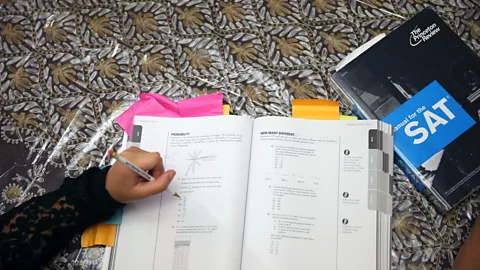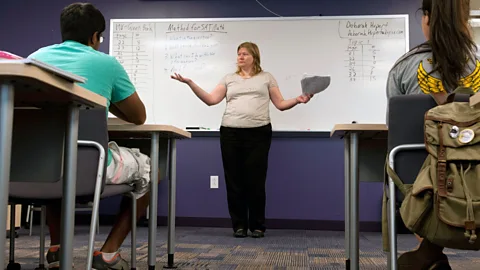During test-optional college admissions, exam-prep companies still thrived

Standardised tests such as the SAT and ACT have been optional at many US colleges since 2020. But many applicants still took them – and paid a premium for higher scores.
For many students in the US, applying for university means sitting for a long, often gruelling standardised tests that could make or break acceptance to their dream school. These tests – commonly the SAT, ACT and Advanced Placement (AP) exams – have been around for decades.
For most students, these exams require a lot of preparation, both to learn the format and the material. As such, many of the millions of American students who take them each year rely on test-prep companies, which help them crack the exam and boost their scores.
This instruction comes at a premium. While some free and low-cost exam tutoring is available, many of the largest companies run group sessions that can cost between $600 and $1,500 (£480 and £1,205) or beyond, depending on duration – or on the extreme end, run into the five figures for private tutoring at the most elite levels. The test prep industry is expected to reach a value of nearly $50bn (£39.6bn) within the next few years.
According to the College Board, which develops and administers standardised tests, 2.2 million American students in the class of 2019 took the SAT, an increase of 4% over the past year. It was the largest group ever. During the pandemic, however, amid mass cancellations at testing centres and disruptions in the college admissions process the exams became optional at many US institutions – in most cases, for the first time. Since 2020, they have largely remained voluntary. Since the policy change, the number of students who took the SAT dropped by thousands; for instance, in the class of 2022, only 1.7 million students took the exam.
Yet test-optional admissions policies are on the way out. In April, leading US institutions Harvard University and Caltech announced they would once again require first-year applicants to submit scores from either the SAT, ACT, AP or International Baccalaureate (IB) exams. This followed similar announcements from Yale University, Dartmouth College and Georgetown University earlier in the year. Other colleges are expected to follow suit.
On its face, this is good news for the test-prep industry, which stands to benefit from customers keen to ace once-again compulsory exams. But experts in the industry say these companies' bottom lines held surprisingly steady during the four years of test-optional admissions. In fact, many of the test-prep industry's largest players emerged largely unscathed. That's because some students continued to take the exams and pay for the prep courses. Many were betting that even though test weren't required, reporting solid scores would put their applications at the top of the pile. And by and large, they were right.
 Getty Images
Getty Images'The ups and downs'
Despite optional testing policies throughout the past four years, many students continued to prepare for, and subsequently take, entrance exams such as the SAT and ACT. Where some students saw an opportunity to forgo submitting scores, many others ploughed ahead as if nothing had changed. This was particularly the case for those in higher income brackets.
Data from the College Board shows that during 2022, 46% of students who took the SAT came from either the highest (more than $110,244 [£88,678]) or second-highest ($83,766 to $110,244 [£67,379 to £137,054]) quintile in terms of median family income. During 2023, these figures were nearly identical. Comparatively, only about 10% of SAT test-takers during those two years came from the lowest earning quintile ($53,263 [£42,838] or lower).
"Students coming from the highest income levels not only took the SAT more than any other group, but they scored the highest," says Sara Harberson, a former dean of admissions at Pennsylvania's Franklin & Marshall College, and a college admissions expert. Many students from these higher-income groups continued to use test prep services while the exam was optional in the same way they would have in the pre-pandemic landscape.
"It is clear that parents' income directly impacts a student's ability to take standardised tests and perform well on them," she says. "Despite most colleges being test-optional these last few years, colleges have clearly valued students who report test scores – and high scores at that. The wealthier students were at a huge advantage as they were more likely to take standardised tests during the pandemic and perform better."
Business for most exam-prep companies – including both The Princeton Review and Kaplan, executives at each company told the BBC – hummed along as students continued to take high-priced classes, just as they would have pre-pandemic. Throughout the test-optional years, industry leaders say many students were advised by both experts and parents to act as if nothing had changed in order to stand out, especially if their kids were applying to highly selective colleges, which saw a spike in applicants during the period.
 Getty Images
Getty Images"I had to tell parents that they needed to invest in test prep," says Harberson. "Scores matter in this landscape so much that if a family needs to choose how to spend money in regard to the college admissions process, I want families to invest in test prep."
"Despite shifting college admission requirements, The Princeton Review never pivoted away from providing students with resources for the SAT and ACT," says Rob Franek, editor-in-chief at The Princeton Review, one of the largest test-prep companies in the US. "Over the past four years, more than 13 million students took the SAT and or ACT… Test scores have continued to matter to colleges."
More like this:
He says test scores also matter in determining tuition factors such as financial aid, scholarships and grants, so many students continued to take the exams when they were optional. In a survey released from The Princeton Review in February, 36% of respondents said financial aid was their main reason for taking the standardised exams. "With 98% of our respondents reporting they will need financial aid to pay for college, we think this is a very significant reason students are taking the SAT and ACT."
Preparing for a new era
Even as revenue has remained relatively steady throughout the past four years, the restoration of past exam policies should help drive more customers. "As many of those schools have come back to making it a requirement, that has led to a surge again in that business," says Steven Marietti, the chief commercial officer for supplemental education at Kaplan, which has operated for 85 years.
A revamped SAT for 2024 – now shorter and digital – offers even more potential revenue. While the exam will remain similar at its core, even minor changes have sent students scrambling to prepare. Harberson says the changes are a business boon: "I guarantee the test-prep industry has gotten a big boost."
And as college admissions change with more applications than ever, exam scores may be more important than ever. "Colleges are spending four or five minutes on an application," adds Harberson. With so little time to take everything into consideration, "students better jump off the page".
--
For the best of BBC.com in your inbox every Friday, sign up to The Essential List newsletter for a handpicked selection of features, videos and can't-miss news.
